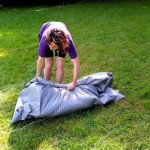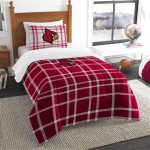When Should Babies Have Bedding?
As a new parent, you may be wondering when your baby is ready for bedding. The answer depends on several factors, including your baby's age, development, and sleeping habits.
Safety First
The most important thing to consider when deciding when to give your baby bedding is safety. Soft bedding, such as pillows, blankets, and stuffed animals, can increase the risk of Sudden Infant Death Syndrome (SIDS) and other sleep-related deaths. For this reason, the American Academy of Pediatrics (AAP) recommends that babies sleep in a bare crib without any soft bedding until they are at least 1 year old.
Signs of Readiness
Once your baby is 1 year old, you can start to think about introducing bedding. However, it's important to look for signs that your baby is ready. These signs include:
- Rolling over: If your baby can roll over from their back to their stomach and back again, they are less likely to get tangled in blankets or pillows.
- Sitting up: If your baby can sit up on their own, they can more easily move themselves out of blankets or pillows that are covering their face.
- Pulling up to stand: If your baby can pull themselves up to stand, they are more likely to be able to get out of bed if they need to.
Choosing Safe Bedding
Once you're sure your baby is ready for bedding, you'll need to choose safe products. Look for bedding that is:
- Firm: Mattresses should be firm and flat, with no soft spots or indentations.
- Fitted: Sheets should fit snugly around the mattress, with no loose corners or gaps.
- Breathable: Blankets and sleep sacks should be made of breathable materials, such as cotton or muslin.
- Washable: Bedding should be machine-washable and dryer-safe.
Creating a Safe Sleep Environment
In addition to choosing safe bedding, you'll also need to create a safe sleep environment for your baby. This means:
- Putting your baby to sleep on their back: This is the safest sleep position for babies.
- Keeping your baby's sleep area free of soft objects: This includes pillows, blankets, stuffed animals, and toys.
- Maintaining a cool room temperature: Babies sleep best in a cool room, between 68 and 72 degrees Fahrenheit.
- Using a white noise machine or fan: These can help to block out noise and create a more soothing sleep environment.
Conclusion
By following these tips, you can help your baby sleep safely and comfortably. If you have any questions about your baby's sleep, talk to your pediatrician.

When Is It Safe For My Baby To Sleep With A Blanket

When Can Your Baby Sleep With A Blanket At Night

Doctors Warn That Soft Bedding Puts Babies At Risk Shots Health News Npr

Nih Alerts Caregivers To Increase In Sids Risk During Cold Weather National Institutes Of Health

7 Vital Sleep Rules To Help Keep Your Baby Safe Madeformums

When Is It Safe For My Baby To Sleep With A Blanket

7 Vital Sleep Rules To Help Keep Your Baby Safe Madeformums

When Can Babies Sleep With Blankets Babycenter

How To Keep Your Baby Warm At Night And Why S Hands Feel Cold Babycenter

Bedding Amount Recommended For Safe Sleep Red Nose
Related Posts








